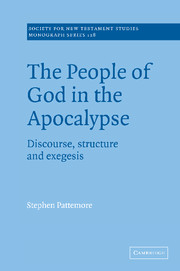Book contents
- Frontmatter
- Contents
- List of figures and table
- Preface
- List of abbreviations
- 1 A question of relevance
- 2 Relevance Theory in biblical interpretation
- 3 A cognitive environment for the Apocalypse
- 4 Souls under the altar – a martyr ecclesiology
- 5 Companions of the Lamb – a messianic ecclesiology
- 6 The New Jerusalem, bride of the Lamb
- 7 Summary and conclusions
- Appendix: Abbreviated discourse outline
- Bibliography
- Index
2 - Relevance Theory in biblical interpretation
Published online by Cambridge University Press: 22 September 2009
- Frontmatter
- Contents
- List of figures and table
- Preface
- List of abbreviations
- 1 A question of relevance
- 2 Relevance Theory in biblical interpretation
- 3 A cognitive environment for the Apocalypse
- 4 Souls under the altar – a martyr ecclesiology
- 5 Companions of the Lamb – a messianic ecclesiology
- 6 The New Jerusalem, bride of the Lamb
- 7 Summary and conclusions
- Appendix: Abbreviated discourse outline
- Bibliography
- Index
Summary
Introduction
How do humans communicate their thoughts to one another? An influential paradigm over several decades has been the code model, whereby a sender encodes a thought in a linguistic message which is transmitted by some medium to a receiver, who decodes the message to produce a replication of the original thought. While this model may accurately represent some physical communication processes, it has at best only partial success with the psychological dimensions of human communication. In particular, it offers no adequate explanation for the importance of inference at all levels (from simple gestures, through figures of speech such as hyperbole and irony, all the way to complex symbolic representation and institutional language), whereby what is communicated is something other than what is encoded in the message. Relevance Theory (RT), as developed by Sperber and Wilson, provides a rigorous, pragmatic account of the process of communication, including especially the role of inference. In this chapter I shall summarize the theory, note some reactions to it, and then discuss its application to the interpretation of literary texts, with particular focus on its implications for understanding the Bible. This will lead to a summary of how RT might be used to investigate the Apocalypse.
Relevance Theory
Background
Sperber and Wilson, while acknowledging that encoding and decoding take place in communication, hold that these processes are inadequate to explain how communication works, unless supplemented by, or subordinated to, a process of implication and inference:
[T]he linguistic meaning of an uttered sentence falls short of encoding what the speaker means: it merely helps the audience infer what she means. […]
Information
- Type
- Chapter
- Information
- The People of God in the ApocalypseDiscourse, Structure and Exegesis, pp. 13 - 50Publisher: Cambridge University PressPrint publication year: 2004
